Eating nutritious food is important for you and your baby during pregnancy. It’s essential to have a well-balanced diet that includes plenty of fruits and veggies. Not only do they provide essential vitamins, minerals, and fiber, but they also contribute to a healthy pregnancy. Choosing the right fruits is crucial for optimal health during this special time. In this article, I will share with you the top fruits to eat during pregnancy, ensuring that you and your baby receive the best nutrition possible.
Key Takeaways:
- Include plenty of fruits and vegetables in your pregnancy diet for essential nutrients.
- Choose a variety of fruits to ensure you get a wide range of vitamins and minerals.
- Frozen and canned fruits can be just as nutritious as fresh ones.
- Aim for 2 to 4 servings of fruit per day and stay hydrated.
- Consult with your doctor if you have any concerns about your pregnancy eating plan.
“Before consuming different fruits during pregnancy, it’s important to consult with a healthcare specialist to ensure safety and proper nutrition.”
The Benefits of Eating Fruit During Pregnancy
Eating fruits during pregnancy is essential for maintaining a healthy diet and promoting optimal health for both you and your baby. Fruits are packed with nutrients, including vitamins, minerals, and fiber, which are vital for the development and growth of your baby. Additionally, consuming a variety of fruits can provide numerous benefits that contribute to a well-rounded pregnancy diet.
Fruits offer a wide range of nutrients that are necessary for a healthy pregnancy. They are rich in vitamins, such as vitamin C, vitamin A, and folate, which are crucial for supporting your baby’s immune system, brain development, and preventing neural tube defects. Additionally, fruits provide essential minerals like potassium and magnesium, which are vital for maintaining electrolyte balance, preventing muscle cramps, and supporting overall health during pregnancy.
Another benefit of eating fruits during pregnancy is their ability to prevent constipation, a common discomfort experienced by expectant mothers. Fruits are high in fiber and water content, which helps promote regular bowel movements and aids in digestion. By incorporating fruits into your diet, you can prevent and alleviate constipation while enjoying a delicious and nutritious snack.
The Importance of Consuming a Variety of Fruits
It is important to consume a variety of fruits during pregnancy to ensure you are obtaining a wide range of nutrients. Different fruits offer unique health benefits, and incorporating a variety of colors and flavors into your diet can provide a diverse array of vitamins, minerals, and antioxidants. Whether it’s the hydrating properties of citrus fruits like oranges and lemons, the immune-boosting benefits of berries, or the nutrient-dense properties of avocados and mangoes, each fruit contributes its own set of nutritional advantages to support a healthy pregnancy.
Oranges – A Citrusy and Nutritious Choice
When it comes to incorporating fruits into your pregnancy diet, oranges are an excellent choice. These citrus fruits not only provide a refreshing burst of flavor, but they also offer a wide range of health benefits for both you and your baby.
One of the key benefits of oranges during pregnancy is their high folate content. Folate is a vital nutrient that helps prevent neural tube defects and supports the healthy development of your baby’s brain and spine. Including oranges in your diet can help ensure that you’re getting an adequate amount of folate to support your baby’s growth.
Oranges are also rich in vitamin C, which is essential for a strong immune system and plays a crucial role in iron absorption. As a pregnant woman, your immune system may be more susceptible to infections and illnesses, so consuming foods that boost your immunity, like oranges, is important. Additionally, the vitamin C in oranges can help enhance the absorption of iron from plant-based sources, such as leafy greens and legumes, which is particularly beneficial if you follow a vegetarian or vegan diet.
Furthermore, oranges can help keep you hydrated during pregnancy due to their high water content. Staying hydrated is essential for maintaining optimal bodily functions and supporting your baby’s development. Plus, the juicy and refreshing nature of oranges can be a welcome treat, especially if you’re experiencing morning sickness or have a decreased appetite.
Incorporating oranges into your pregnancy diet is easy. You can enjoy them as a standalone snack, add slices to your salads or desserts, or even squeeze fresh orange juice. However, it’s important to note that consuming whole oranges provides the added benefit of fiber, which aids in digestion and helps prevent constipation, a common discomfort during pregnancy.
The Benefits of Oranges During Pregnancy:
- High in folate, supporting proper brain and spinal development
- Rich in vitamin C, boosting the immune system and aiding iron absorption
- Keeps you hydrated due to their high water content
- Provides dietary fiber, aiding digestion and preventing constipation
By including oranges in your pregnancy diet, you can enjoy a tasty and nutritious fruit that offers numerous benefits for both you and your baby. From supporting brain development to boosting your immune system, oranges are an excellent addition to your overall prenatal nutrition plan.
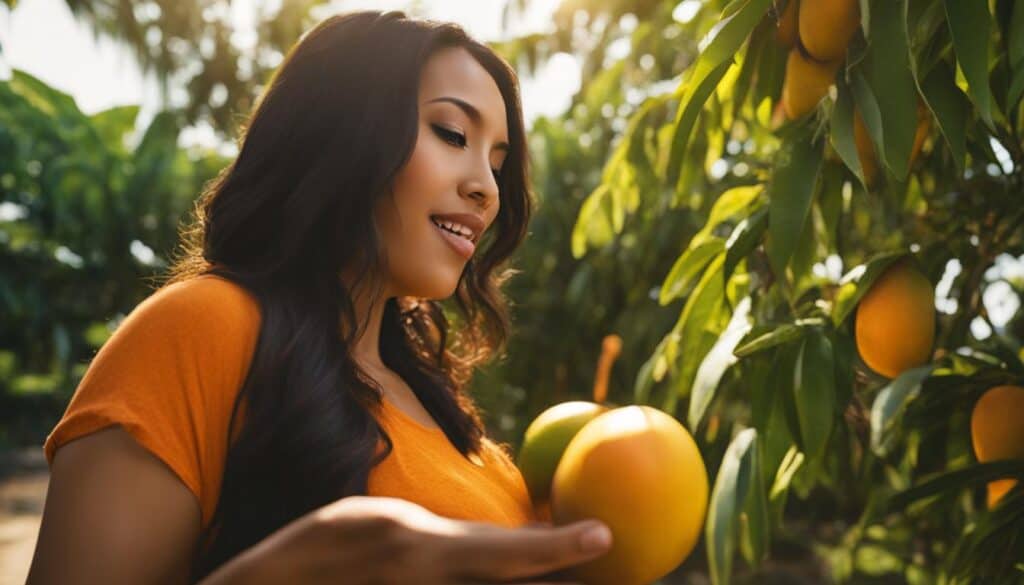
Mangoes – A Tropical Delight Packed with Nutrition
When it comes to enjoying a refreshing and nutritious fruit during pregnancy, mangoes are a top choice. These tropical delights offer a host of benefits for both you and your growing baby. Rich in essential vitamins and minerals, mangoes can help support optimal health during this crucial time.
One of the standout benefits of mangoes is their high vitamin C content. Vitamin C plays a vital role in boosting your immune system, which is particularly important during pregnancy. Additionally, mangoes provide a good dose of vitamin A, which is essential for your baby’s immune system and overall development.
Mangoes are also a great source of fiber, which helps support healthy digestion and can aid in preventing constipation, a common pregnancy discomfort. Including mangoes in your diet can provide a refreshing and tropical twist while offering a range of health benefits.
| Nutrient | Amount per serving |
|---|---|
| Vitamin C | 67% of the recommended daily intake |
| Vitamin A | 25% of the recommended daily intake |
| Fiber | 3 grams per serving |
Enjoy mangoes as a standalone snack, add them to smoothies, or incorporate them into fruit salads for a burst of tropical flavor. Remember to wash and peel the mangoes before consuming to ensure food safety.
Incorporating mangoes into your pregnancy diet can provide you with a delicious and nutritious fruit option. Their rich vitamin C and fiber content, along with their refreshing taste, make them a great addition to support a healthy and balanced diet during pregnancy.
Avocados – Creamy and Nutrient-Rich
When it comes to a nutritious and delicious fruit during pregnancy, avocados are a top choice. Not only are they creamy and flavorful, but they also offer a wide range of health benefits for both you and your baby.
One of the standout advantages of avocados is their high folate content. Folate is a vital nutrient during pregnancy as it aids in the development of your baby’s brain and nerves. Avocados are also rich in other essential nutrients, including potassium, vitamin C, vitamin B, vitamin K, magnesium, and choline.
Avocados can help relieve common pregnancy symptoms such as nausea and leg cramps. Additionally, their healthy fats provide energy and support your baby’s growth. Whether added to salads, spread on toast, or blended into smoothies, avocados are a versatile fruit that can be enjoyed in numerous ways during pregnancy.
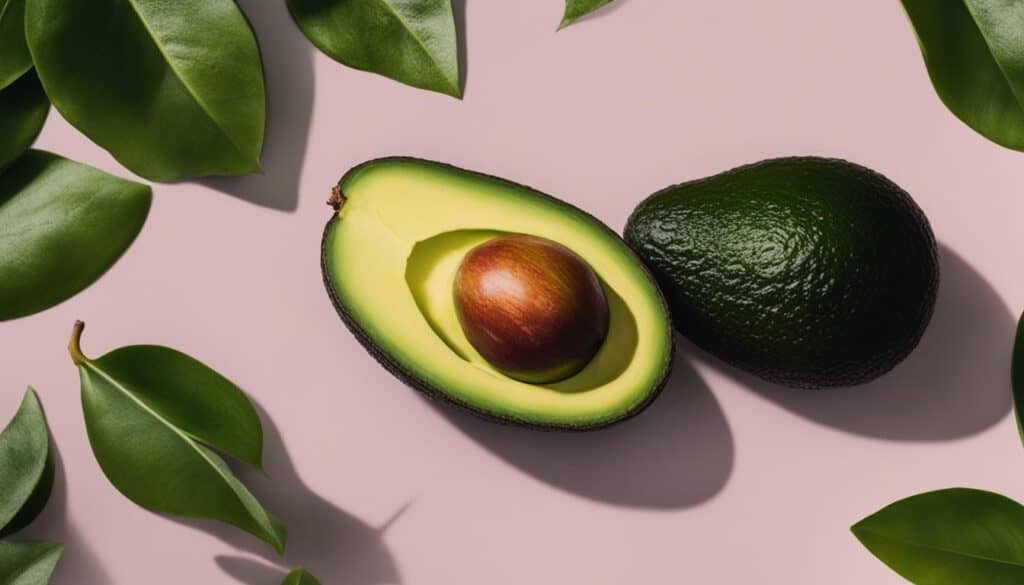
The Benefits of Avocados during Pregnancy
- High folate content for brain and nerve development
- Packed with essential nutrients like potassium, vitamin C, and magnesium
- Helps relieve nausea and leg cramps
- Provides energy and supports baby’s growth
“Avocados are a superfood that can significantly contribute to a healthy pregnancy. Their nutrient-rich profile makes them an excellent choice for expectant mothers.” – Nutritionist, Dr. Emily Carter
Lemons – More Than Just a Refreshing Flavor
When it comes to pregnancy, lemons offer more than just a tangy and refreshing flavor. These citrus fruits are packed with health benefits that can support your well-being and that of your baby. Lemons are known for their high vitamin C content, which not only boosts your immune system but also aids in digestion and helps relieve constipation, a common issue during pregnancy. The zesty aroma of lemons has even been reported to help alleviate pregnancy-related nausea. Whether added to water, tea, or used in various recipes, lemons can be a versatile and beneficial addition to your pregnancy diet.
“The zesty aroma of lemons has even been reported to help alleviate pregnancy-related nausea.”
In addition to vitamin C, lemons also contain other essential vitamins and minerals that are vital for a healthy pregnancy. These include vitamin B, potassium, and magnesium. The combination of these nutrients aids in the development of your baby’s brain and nerves. Lemons are also a natural source of hydration due to their high water content, which is important during pregnancy to support proper bodily functions and prevent dehydration. So, don’t underestimate the power of lemons beyond their refreshing taste!
Lemon Water: A Refreshing and Hydrating Option
One popular way to incorporate lemons into your pregnancy diet is by enjoying lemon water. It’s a simple and refreshing beverage that offers hydration, a dose of vitamin C, and a burst of flavor without the added sugars or calories found in sugary drinks. To make lemon water, simply squeeze the juice of a lemon into a glass of water and stir. You can also add a few lemon slices for an extra hint of flavor. It’s a great option to stay hydrated while enjoying the benefits of lemons during your pregnancy.
| Nutrient | Amount per 100g |
|---|---|
| Vitamin C | 53 mg |
| Vitamin B6 | 0.08 mg |
| Potassium | 138 mg |
| Magnesium | 8 mg |
While lemons offer numerous benefits during pregnancy, it’s always important to consult with your healthcare provider before making any significant changes to your diet. They can provide personalized recommendations based on your specific health needs. Incorporating lemons into a well-balanced pregnancy diet can be a refreshing and nutritious way to support your overall well-being and enjoy a variety of flavors during this special time.
Bananas – Filling and Nutrient-Dense
When it comes to choosing the best fruit during pregnancy, bananas are a top contender. Not only are they delicious, but they also offer a range of benefits for expectant mothers. Bananas are known for their filling nature and high nutritional value, making them an excellent addition to a pregnancy diet.
One of the main benefits of bananas during pregnancy is their high potassium content. Potassium is essential for maintaining fluid balance and can help relieve common pregnancy symptoms like leg cramps. Additionally, bananas contain vitamin B6, which may help alleviate nausea and vomiting in early pregnancy.
Aside from their potassium and vitamin B6 content, bananas are also rich in vitamin C and fiber. Vitamin C is crucial for a strong immune system and can promote the absorption of iron, an essential nutrient during pregnancy. Meanwhile, the fiber in bananas can aid in digestion and alleviate constipation, a common issue among expectant mothers.
| Nutrient | Amount per 100g |
|---|---|
| Potassium | 358mg |
| Vitamin B6 | 0.4mg |
| Vitamin C | 8.7mg |
| Fiber | 2.6g |
With their natural sweetness and creamy texture, bananas can also be a healthy alternative to satisfy sweet cravings. They can be enjoyed on their own, added to smoothies, or even used as a natural sweetener in baked goods. Including bananas in your pregnancy diet can provide you with energy, essential nutrients, and a delicious treat.
Remember to always consult with your healthcare provider or a registered dietitian before making any significant changes to your diet during pregnancy.
Summing It Up
Bananas are a filling and nutrient-dense fruit that offer several benefits during pregnancy. Their high potassium content can help relieve leg cramps, while vitamin B6 may alleviate nausea. The vitamin C and fiber in bananas promote a strong immune system, aid in digestion, and prevent constipation. Whether eaten on their own or incorporated into various recipes, bananas are a tasty and healthy addition to a pregnancy diet.
Berries – Bursting with Nutrients
Berries are a delightful addition to any pregnancy diet. They are not only delicious but also packed with essential nutrients that can support the health and development of both you and your baby. Whether you prefer blueberries, raspberries, strawberries, blackberries, or goji berries, these small fruits offer a wide range of benefits.
One of the key advantages of consuming berries during pregnancy is their high content of vitamins and minerals. Berries are rich in vitamin C, which is important for boosting your immune system and supporting the formation of collagen for healthy skin and tissue. They also contain folate, a crucial nutrient for the early development of your baby’s neural tube.
In addition to vitamins, berries are also a great source of antioxidants. Antioxidants help protect your body from harmful free radicals and oxidative stress. These compounds can help reduce inflammation, support heart health, and even lower the risk of certain pregnancy complications. Including a variety of berries in your diet can provide a diverse range of antioxidants, offering maximum benefits.
| Nutritional Content of Berries | |
|---|---|
| Berry Type | Nutritional Highlights |
| Blueberries | Rich in antioxidants, fiber, vitamin C, and vitamin K. |
| Raspberries | High in fiber, vitamin C, and manganese. |
| Strawberries | Excellent source of vitamin C, folate, and manganese. |
| Blackberries | Contain high levels of antioxidants, fiber, and vitamin C. |
| Goji Berries | Rich in antioxidants, fiber, and vitamin A. |
Lastly, berries are a great choice for pregnant women due to their high fiber content. Fiber aids in digestion, prevents constipation, and helps you feel fuller for longer. This can be especially beneficial if you’re experiencing pregnancy-related digestive issues. The fiber found in berries can also help regulate your blood sugar levels, keeping them stable throughout the day.
When incorporating berries into your diet, opt for organic varieties whenever possible. This can minimize your exposure to harmful pesticides and ensure you’re getting the highest quality fruit. Consider adding berries to your morning cereal, blending them into smoothies, or enjoying a handful as a nutritious snack. With their vibrant colors and sweet flavors, berries are a delightful way to nourish yourself and your growing baby during pregnancy.
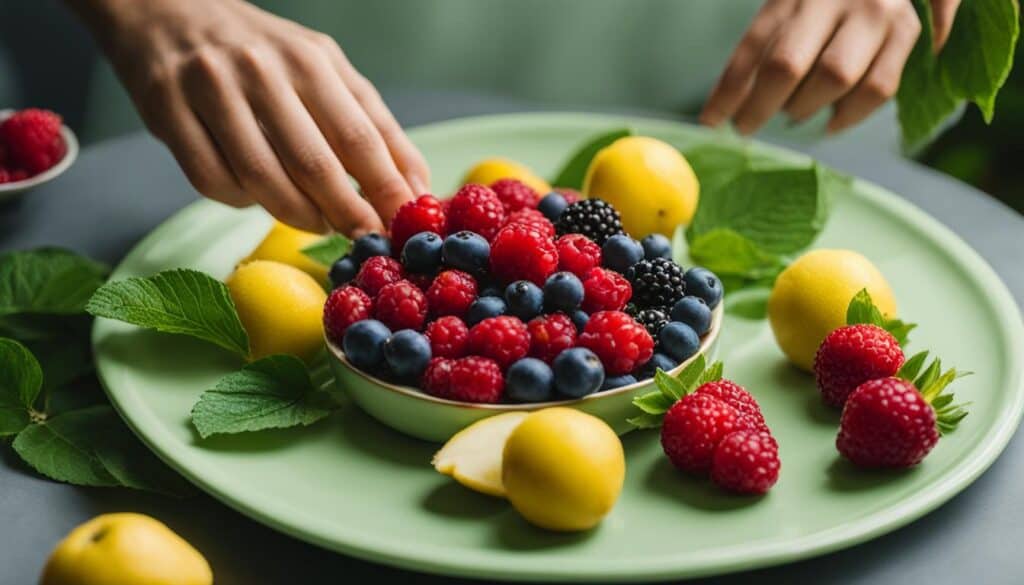
Apples – Crunchy and Nutrient-Packed
When it comes to incorporating nutritious fruits into your pregnancy diet, look no further than apples. These crunchy and refreshing fruits offer a range of health benefits for both you and your baby.
One of the key advantages of including apples in your pregnancy diet is their high fiber content. Fiber is essential for preventing constipation, a common discomfort experienced during pregnancy. By promoting regular bowel movements, apples can help you maintain digestive health throughout this important journey.
In addition to fiber, apples are rich in important vitamins and minerals. They contain vitamin C, which boosts your immune system and supports the healthy development of your baby. Apples are also a good source of vitamin A and potassium, both of which play crucial roles in maintaining overall health during pregnancy.
| Nutrient | Quantity per 100g |
|---|---|
| Energy | 52 kcal |
| Carbohydrates | 14g |
| Fiber | 2.4g |
| Folate | 3µg |
| Vitamin C | 0.5mg |
| Potassium | 107mg |
Apples are also a source of pectin, a prebiotic that feeds the beneficial bacteria in your gut. This can contribute to a healthy gut microbiome, which plays a role in digestion and overall well-being. When enjoying apples, make sure to rinse them thoroughly before eating to remove any potential pesticide residue, and consider opting for organic varieties when available.
“I love incorporating apples into my pregnancy diet. Not only are they a delicious and satisfying snack, but they also provide a range of essential nutrients for me and my baby.” – Emily, expecting mother
Now that you know the benefits of including apples in your pregnancy diet, you can enjoy these nutrient-packed fruits as part of your well-rounded eating plan. Whether you prefer to enjoy them fresh, sliced in salads, or blended into a refreshing smoothie, apples offer a versatile and nutritious addition to support your journey towards a healthy pregnancy.

Fruit Recommendations and Daily Intake During Pregnancy
During pregnancy, it is important to consume a variety of fruits to ensure you and your baby receive a wide range of essential nutrients. Medical professionals typically recommend eating two to four servings of fruit per day. One serving of fruit can consist of a medium piece of whole fruit or 1 cup of cut fruit.
To help you plan your fruit intake, here are some recommendations for pregnant women:
- Include a mix of different fruits in your diet to benefit from their unique nutritional profiles. Some great options include oranges, mangoes, avocados, lemons, bananas, berries, and apples.
- Consider incorporating 100% fruit juices, dried fruit, and fruit smoothies into your diet, but be mindful of added sugars and calories.
- Stay hydrated by consuming fruits with high water content, such as oranges, watermelons, and strawberries.
It’s important to be cautious of fruit safety as well. Choose organic fruits whenever possible to avoid synthetic pesticides and fertilizers. Additionally, proper washing and storing of fruits can help reduce the risk of consuming pesticide residue or bacteria.
Table: Recommended Daily Fruit Intake During Pregnancy
| Fruit | Serving Size | Benefits |
|---|---|---|
| Oranges | 1 medium orange | High in vitamin C and folate |
| Mangoes | 1 cup sliced mango | Rich in vitamins A and C, and a good source of fiber |
| Avocados | 1/2 medium avocado | Contains healthy fats, folate, and potassium |
| Lemons | 1 medium lemon | High in vitamin C and aids in digestion |
| Bananas | 1 medium banana | Rich in potassium and vitamin B6 |
| Berries (blueberries, raspberries, strawberries, blackberries, goji berries) | 1 cup mixed berries | Provide antioxidants, vitamins, and fiber |
| Apples | 1 medium apple | Good source of fiber and vitamin C |
By following these fruit recommendations and including a variety of fruits in your daily diet, you can ensure optimal nutrition for a healthy pregnancy. Remember to consult with your doctor or healthcare provider if you have any specific dietary concerns or questions.
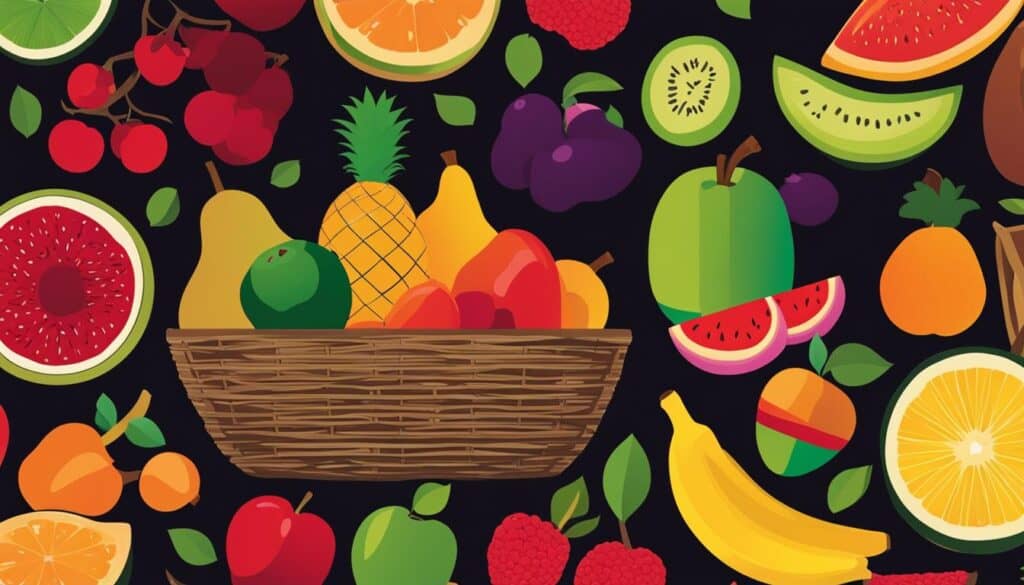
Importance of Hydration and Fruit Safety Tips
Staying hydrated during pregnancy is crucial for both you and your baby’s health. Dehydration can have serious consequences during pregnancy, so it’s important to ensure you’re getting enough fluids. Drinking 8 to 12 glasses of water daily is recommended, and fruits can help contribute to your daily water intake. Fruits, such as watermelon and citrus fruits, have high water content and can help keep you hydrated throughout the day.
When it comes to fruit safety, choosing organic fruits is the best option to avoid synthetic pesticides and fertilizers. Organic fruits are grown without these harmful substances, making them a safer choice for pregnant women. It’s also important to properly wash fruits before consuming them to reduce the risk of bacteria or pesticide residue. Simply rinse the fruits under cool running water and gently scrub them with a brush if necessary.
Additionally, it’s important to be aware of any food allergies or intolerances you may have. Some fruits, such as strawberries or kiwis, may cause allergic reactions in certain individuals. If you have any known allergies, it’s best to avoid those specific fruits or consult with a healthcare professional to ensure they are safe for you to consume during pregnancy.
Fruit Safety Tips During Pregnancy
- Choose organic fruits to avoid synthetic pesticides and fertilizers.
- Wash fruits thoroughly under cool running water before consuming.
- Gently scrub fruits with a brush if necessary.
- Avoid fruits that you are allergic to or consult a healthcare professional.
By staying hydrated and following fruit safety tips, you can enjoy the benefits of consuming fruits during pregnancy while ensuring the safety of you and your baby. Remember to always consult with your healthcare provider if you have any specific concerns or questions regarding your pregnancy diet.

Conclusion
As an expectant mother, I understand the importance of nourishing both myself and my baby with the best fruits during pregnancy. Including a variety of nutritious fruits in your diet can provide essential vitamins, minerals, fiber, and antioxidants that promote optimal health and development.
Among the top fruit choices for pregnant women are oranges, mangoes, avocados, lemons, bananas, berries, and apples. Oranges and mangoes offer vital nutrients like folate, vitamin C, and vitamin A, while avocados provide healthy fats, potassium, and important brain development nutrients. Lemons can aid digestion and boost immunity, while bananas offer potassium and vitamin B6 to relieve leg cramps and nausea. Berries are nutrient powerhouses, packed with antioxidants, while apples are a versatile source of fiber and beneficial nutrients like vitamin C and pectin.
It’s important to follow the recommended daily intake of two to four servings of fruit, which can include whole fruits, cut fruit, dried fruit, or 100% fruit juices. Staying hydrated is also crucial, and fruits with high water content can contribute to your daily water intake. Remember to choose organic fruits whenever possible to reduce exposure to harmful pesticides and wash them thoroughly before consumption.
For expectant mothers, incorporating these essential fruits into your pregnancy diet can provide numerous health benefits for you and your baby. Consult with your doctor for personalized advice and guidelines, and enjoy the journey of nurturing yourself and your baby with the goodness of nature’s bountiful fruits.
FAQ
Q: Why is eating fruit important during pregnancy?
A: Eating fruit during pregnancy is important because it provides essential vitamins, minerals, and fiber that you and your baby need for a healthy pregnancy. Fruits also help prevent constipation and can provide hydration and satisfy sweet cravings without empty calories.
Q: What are the benefits of oranges during pregnancy?
A: Oranges are a great choice of fruit during pregnancy because they are a good source of folate, which is important for preventing neural tube defects. They are also high in vitamin C, which boosts the immune system and helps with iron absorption.
Q: Why should mangoes be included in a pregnancy diet?
A: Mangoes are a delicious and nutritious fruit to include in your pregnancy diet. They are packed with vitamin C and vitamin A, which are important for your baby’s immune system and overall development. Mangoes are also a good source of fiber and can help prevent constipation.
Q: What are the benefits of avocados during pregnancy?
A: Avocados are a superfood that can provide numerous benefits during pregnancy. They are rich in folate, potassium, and healthy fats, and contain important nutrients like vitamin C, vitamin B, vitamin K, magnesium, and choline. Avocados are crucial for the development of your baby’s brain and nerves, and can help relieve nausea and leg cramps.
Q: How can lemons benefit pregnant women?
A: Lemons are high in vitamin C, which can boost the immune system and aid in digestion, helping to relieve constipation. Some pregnant people have reported success in using lemons or lemon scent to help relieve pregnancy-related nausea. Lemons can be added to water, tea, or used in various recipes to provide a tangy and refreshing flavor while offering a range of health benefits.
Q: Why should bananas be included in a pregnancy diet?
A: Bananas are a great choice of fruit during pregnancy because they are rich in potassium, which can help relieve leg cramps. They also contain vitamin B6, vitamin C, and fiber, which can help prevent constipation. Additionally, vitamin B6 may help relieve nausea and vomiting in early pregnancy.
Q: Why are berries beneficial during pregnancy?
A: Berries such as blueberries, raspberries, strawberries, blackberries, and goji berries are nutrient powerhouses that can greatly benefit your pregnancy. They are rich in carbohydrates, vitamin C, fiber, and folate. Berries offer antioxidants, which help protect your body from cell damage, and are a great source of phytonutrients like flavonoids and anthocyanins.
Q: What are the benefits of including apples in a pregnancy diet?
A: Apples are a versatile and nutritious fruit to include in your pregnancy diet. They are high in fiber, which can help prevent constipation. Apples also contain vitamin C, vitamin A, potassium, and pectin, a prebiotic that feeds good bacteria in your gut. Eating the peel of apples can provide additional nutrients.
Q: How much fruit should I consume during pregnancy?
A: Medical professionals usually recommend eating two to four servings of fruit per day during pregnancy. One serving of fruit can consist of a medium piece of whole fruit or 1 cup of cut fruit. It’s important to include a variety of fruits in your diet to ensure you’re getting a wide range of nutrients.
Q: How can I stay hydrated during pregnancy?
A: Staying hydrated during pregnancy is crucial for both you and your baby’s health. Fruits can contribute to your daily water intake due to their high water content. It’s recommended to drink 8 to 12 glasses of water daily. When selecting fruits, it’s best to choose organic options to avoid synthetic pesticides and fertilizers.
Q: What are some fruit safety tips during pregnancy?
A: It’s important to properly wash and store fruits to reduce the risk of consuming pesticide residue or bacteria. Rinse fruits thoroughly under running water and scrub with a produce brush if necessary. Avoid consuming fruits that are bruised, damaged, or past their expiration date.

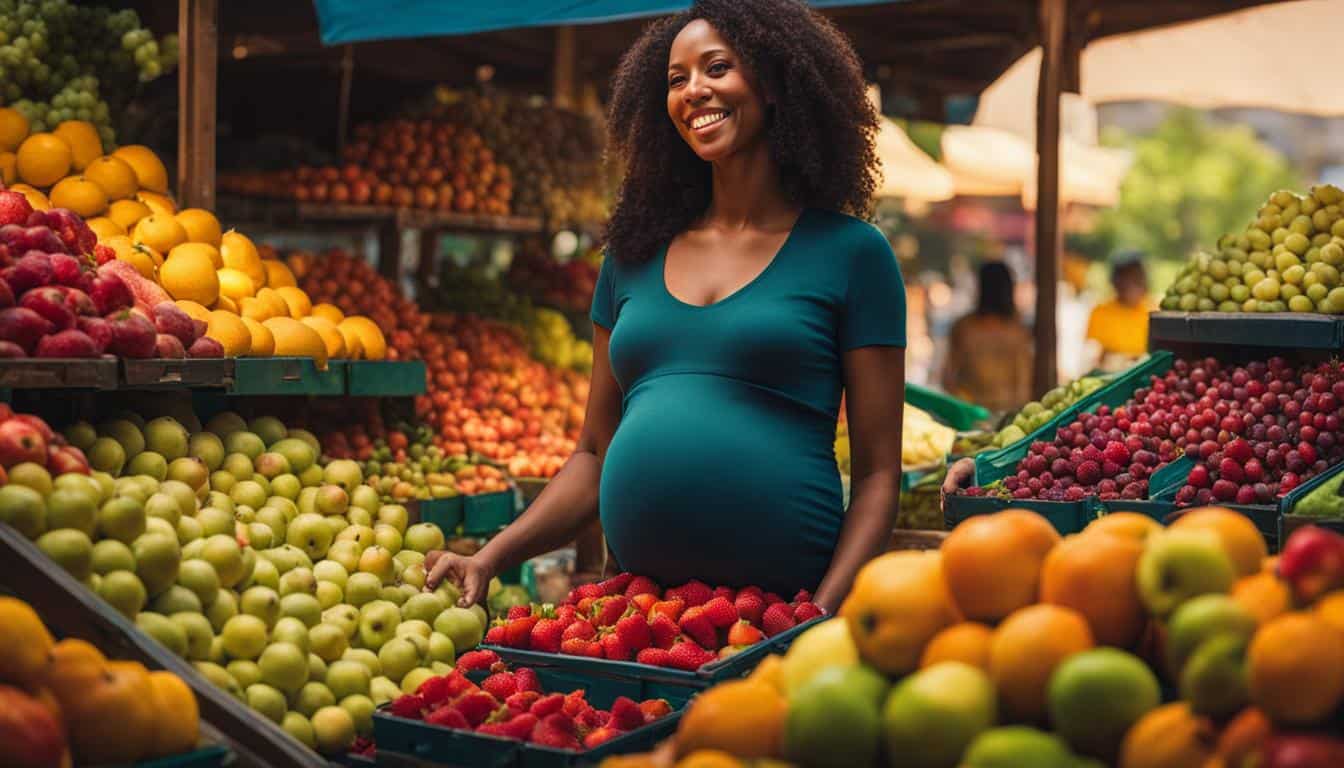



Leave a Reply